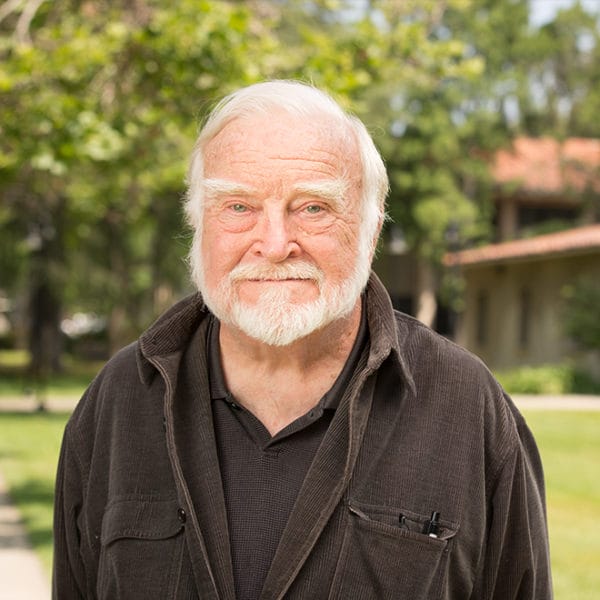Mihaly Csikszentmihalyi was the pioneering co-founder of the field of positive psychology. Known to many as the “father of flow”—a term he coined to refer to the psychological state of optimal performance—Csikszentmihalyi was a researcher, educator, public speaker, and co-director of the university’s Quality of Life Research Center.
He devoted his life to finding an answer to a simple question: What constitutes a happy life?
Affectionately known on the CGU campus as “Mike C,” Mihaly Csikszentmihalyi—with Professor Martin Seligman of the University of Pennsylvania—saw something lacking in psychology’s areas of study. So they set out to develop a focus on happiness, well-being, and positivity with a goal to create a field focused on human well-being and the conditions that enable people to flourish and live satisfying lives.
Csikszentmihalyi’s work with Seligman was preceded by his growing international reputation as the author, in 1990, of Flow: The Psychology of Optimal Experience. A bestseller translated into more than 20 languages, the book’s many admirers include business leaders, President Bill Clinton, British Prime Minister Tony Blair, and Dallas Cowboys coach Jimmy Johnson who, following the team’s 1993 Super Bowl victory, said of Flow that “my team has won because of this book.”
Ideas & Interests
Csikszentmihalyi’s interest in what he later identified as“flow” started during his graduate years at the University of Chicago. He recalled in an interview how he would watch painters in their studios and how he was fascinated by their ability to forget everything while working. He was also surprised by what happened when they were done:
What these artists were after, Csikszentmihalyi realized, wasn’t the finished work itself but the experience of full immersion and absorption in the act of creation.
Csikszentmihalyi went on to study how people attained this state, and in his early work he focused on athletes and artists. He soon discovered that this quality he referred to as “flow” applied to people in many different pursuits, whether they were rock climbers, basketball and hockey players, dancers, composers, or chess masters.
Publications & Awards
Underlying much of Csikszentmihalyi’s pioneering work was his innovative and groundbreaking use of pagers and questionnaires to produce a database based on people’s self-reports of their ordinary experiences.
While Flow: The Psychology of Optimal Experience became a bestseller in 1990 and presented his conclusions based on that database in a warm, humanistic prose style, his other books—The Evolving Self (1993), Creativity (1996), and Good Business (2003)—expanded on his theories in a variety of directions.
Because Csikszentmihalyi’s approach generated a cross-section of daily experience, his analysis paid more attention to experiences of positive states–like enjoyment or creativity–than many of his predecessors. That work formed the theoretical background of his collaboration with Seligman.
Together, in 2000, they published an influential article in American Psychologist, the flagship journal of the American Psychological Association, that introduced the profession to positive psychology. That work was recognized with Csikszentmihalyi’s appointment as a Fellow of the American Academy of Arts and Sciences and his selection for the 2009 Clifton Strengths Prize and the 2011 Széchenyi Prize.
Other awards and distinctions include his receipt, in 2014, of the Grand Cross of the Order of Merit of the Republic of Hungary.
Csikszentmihalyi also has enjoyed a robust following online. Since the first appearance of his 2004 TED Talk, “Flow, the secret to happiness,” it has received some 6,693,254 views.
Lessons & Legacy
With his arrival at CGU in 1999, Csikszentmihalyi founded the Quality of Life Research Center (QLRC) with colleague and co-director Jeanne Nakamura.
One result of Csikszentmihalyi’s work with Seligman on positive psychology was to create several research centers across the country that would focus on the principles of this fledgling field. The goal was to help raise its visibility on university campuses. The QLRC was one of these.
“I am constantly and keenly aware of what a unique and fulfilling privilege it has been to work with Mike in so many capacities here at CGU for the past two decades,” said Nakamura, who is an associate professor of psychology in the university’s Division of Behavioral & Organizational Sciences.
For Nakamura, Csikszentmihalyi was always giving with his time and support to anyone entering the QLRC offices on Dartmouth Avenue. He didn’t have to know them well; he was generous with friends and strangers alike.
That made a deep impression on students, Nakamura noted, and they appreciated “not just Mike’s creativity, intellect, and wisdom but also his humor, warmth, and generosity— he could be unstinting with his time and attention. Visitors to the QLRC were often awed by this.”
Over the years, he continued his research and worked on books and articles. As a result, he has been cited often in many places, from the top journals of his discipline to the pages of Forbes and the New York Times.
Despite a considerable reputation, Csikszentmihalyi was deeply humble with a low-key style of presentation that put students and colleagues alike at ease.
Colleague Stewart Donaldson, with whom Csikszentmihalyi created the Positive Psychology program at CGU, has said that it was “one of Mike’s beliefs that his own pursuit of happiness shouldn’t interfere with other people’s pursuits to be happy.”
